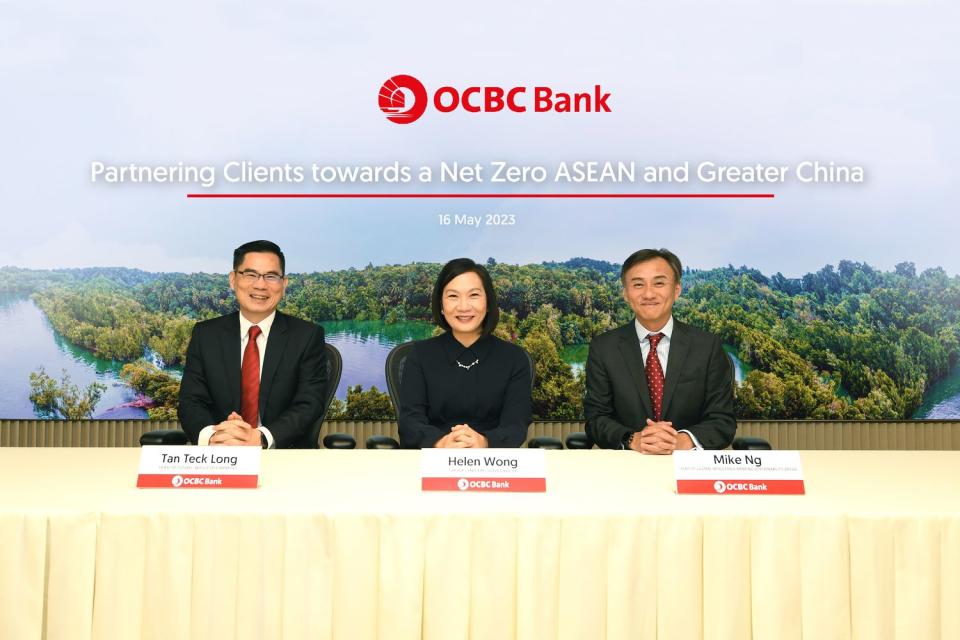OCBC appoints Mike Ng as its first chief sustainability officer

Ng was appointed OCBC's head of sustainability office in the bank’s global wholesale banking unit in June 2022.
Oversea-Chinese Banking Corporation (OCBC) O39 has appointed Mike Ng to the newly-created group chief sustainability officer (CSO) role “with a strong business and client focus”, the bank announced on July 24.
Ng will assume the new role on Aug 1, where he will lead OCBC’s sustainability agenda, including the transition to net zero on lending and wealth management. “With a stronger business performance measurement, the role will go beyond promoting and reporting of environmental, social and governance (ESG) content or strategy to ensure effective business alignment,” says the bank.
Ng joined OCBC in 2010 as head of structured and project finance before expanding his role in 2018 to cover sustainable finance solutions for large corporates. In June 2022, he was appointed head of sustainability office in the bank’s global wholesale banking unit.
According to OCBC, Ng was “instrumental” in shaping the bank’s commitment to cease financing for new coal-fired power plants in April 2019, becoming the first Singapore bank to do so.
OCBC group chief executive officer Helen Wong says the size of the bank required her team to curate the CSO role “differently from other organisations”. “OCBC has always been very strong in community development and governance. In recent years, we have stepped up our efforts in climate actions. Therefore, this new role requires an individual to have a strong sense of business acumen as well as deep expertise not just in sustainability and climate change but also in financial products and services.”
Ng is “a natural fit”, she adds. “He is highly regarded as a sustainable finance veteran with an innovative and forward-looking mind. Throughout his career in OCBC, he has always pushed for greater heights in achieving excellence. I have no doubt that he will be able to replicate the success that he has achieved so far in his new role as the group CSO.”
OCBC’s net-zero plans
Wong, Ng and OCBC’s head of global wholesale banking Tan Teck Long announced in May the bank’s decarbonisation targets for six sectors, along with its plan to achieve net-zero financed emissions by 2050.
This follows the bank’s entry to the Net-Zero Banking Alliance (NZBA) in October 2022, a United Nations-convened, industry-led initiative that supports the implementation of decarbonisation strategies.

Ng also represented OCBC at the COP27 climate conference in Egypt in November 2022, where he spoke on a panel about blended finance at the inaugural Singapore Pavilion.
OCBC has committed more than $47 billion towards its sustainable finance portfolio, and is on track to cross its $50 billion target two years ahead of schedule.
Despite this, Wong revealed at the bank’s 1QFY2023 results in May that it will not be increasing this target soon. “I’m not adjusting this, because [there are] still another two-plus years to 2025. But again, that doesn’t stop our focus on helping our customers to transition to net zero… I don’t see this as a crucial stage to tell everybody [that] because we are [at] $47 billion, I will reset it. This will become very business-as-usual to us; we will continue to grow our sustainable financing. If we continue to grow double-digits every year, whatever target you set becomes just a number to be beaten.”
OCBC set the $50 billion target in 2021 after surpassing its original targets of $10 billion by 2022 and $25 billion by 2025 ahead of time. The latest figure is up another $3 billion from the $44 billion reported at the end of 2022, which, in turn, was up 29.4% from the $34 billion reported a year earlier.
OCBC’s sustainable office launched two sustainable banking products for corporates this year. In March, the bank launched the OCBC 1.5°C loan, which incentivises corporates to set and work towards clear carbon emissions reduction targets. When the targets are met or exceeded, corporates will get a reduced interest rate on their loans.
In July, OCBC partnered with the manager of Frasers Centrepoint Trust to launch Singapore’s first green financing solution comprising a green loan and carbon credits. The $419 million green loan comes with carbon credits in tow, sourced through OCBC’s Emissions Trading Desk.
Banking CSO trio
Ng graduated with a Master of Science (International Accounting and Finance) from the London School of Economics, and a Bachelor of Business (Financial Analysis) from Nanyang Technological University. His appointment rounds out the trio of CSOs from Singapore’s banks.
United Overseas Bank (UOB) U11 appointed Eric Lim as CSO in April 2021, expanding his portfolio from managing director of group finance, which he has held since September 2013.
Meanwhile, DBS Bank D05 appointed Helge Muenkel as group CSO in January 2022. Before joining DBS, Muenkel had worked in Dutch bank ING as the head of Asia-Pacific, sustainable finance and global capital markets. Muenkel succeeded Mikkel Larsen, who in November 2021 became chief executive of carbon trading marketplace Climate Impact X.
As at 11.26am, shares in OCBC are trading 1 cent higher, or 0.08% up, at $12.65.
See Also:
Click here to stay updated with the Latest Business & Investment News in Singapore
Singapore banks' loan growth, fee income 'largely weak'; DBS urges 'hold’ before 2QFY2023 results
Banks’ rally may take a breather ahead of earnings announcements
Citi 'warming up to OCBC' over DBS ahead of 1HFY2023 results, expects 40 cents DPS
Get in-depth insights from our expert contributors, and dive into financial and economic trends

 Yahoo Finance
Yahoo Finance 